-
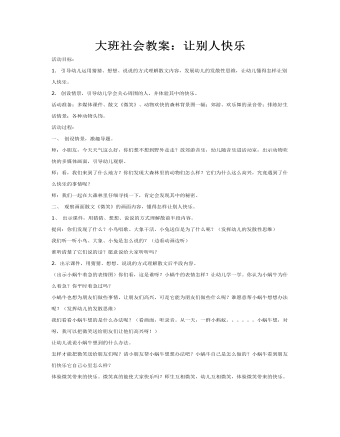
大班社会教案:让别人快乐
一、创设情景,激趣导题。 师:小朋友,今天天气这么好,你们想不想到野外走走?放郊游音乐,幼儿随音乐进活动室,出示动物欢快的多媒体画面,引导幼儿观察。 师:看,我们来到了什么地方?你们发现大森林里的动物们怎么样?它们为什么这么高兴,究竟遇到了什么快乐的事情呢? 师:我们一起在大森林里仔细寻找一下,肯定会发现其中的秘密。 二、观察画面散文《微笑》的画面内容,懂得怎样让别人快乐。 1、出示课件,用猜猜、想想、说说的方式理解散前半段内容。 提问:你们发现了什么?小鸟唱歌、大象干活、小兔送信是为了什么呢?(发挥幼儿的发散性思维) 我们听一听小鸟、大象、小兔是怎么说的?(边看动画边听) 谁听清楚了它们说的话?愿意说给大家听听吗?
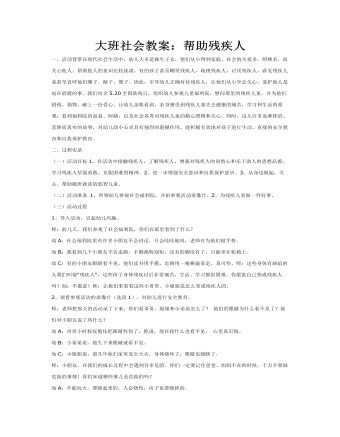
大班社会教案:帮助残疾人
二、过程实录(一)活动目标1、在活动中接触残疾人,了解残疾人,增强对残疾人的同情心和乐于助人的思想品德,学习残疾人坚强勇敢、克服困难的精神。2、进一步增强安全意识和自我保护意识。3、从身边做起,关心、帮助随班就读的弱智儿童。(二)活动准备 1、带领幼儿参观社会福利院,并拍参观活动录像片。2、为残疾儿童做一件好事。(三)活动过程1、导入活动,引起幼儿兴趣。师:前几天,我们参观了社会福利院,你们在那里看到了什么?幼A:社会福利院里有许多小朋友不会讲话,只会哇哇地叫,老师在为他们做手势。幼B:我看到几个小朋友不会走路,手脚都特别短,还有的脚没有了,只能坐在轮椅上。幼C:有的小朋友眼睛看不见,他们读书用手摸,走路用一根棒敲着走,真可怜。师:这些身体有缺陷的人我们叫他"残疾人",这些孩子身体残疾以后非常痛苦,生活、学习都很困难。你愿意自己变成残疾人吗?幼:不愿意!师:让我们来看看这些小哥哥、小姐姐是怎么变成残疾人的。
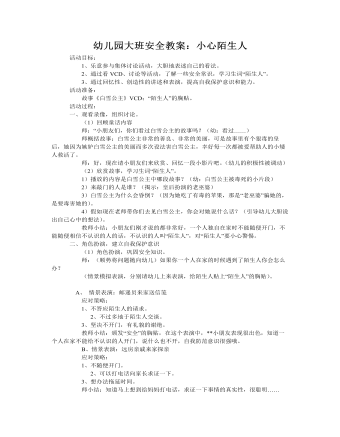
大班安全教案:小心陌生人
一、观看录像,组织讨论。 (1)回顾童话内容 师:“小朋友们,你们看过白雪公主的故事吗?(幼:看过……) 师概括故事:白雪公主非常的善良、非常的美丽,可是故事里有个狠毒的皇后,她因为嫉妒白雪公主的美丽而多次设法害白雪公主,幸好每一次都被爱帮助人的小矮人救活了。 师:好,现在请小朋友们来欣赏、回忆一段小影片吧。(幼儿的积极性被调动) (2)欣赏故事,学习生词“陌生人”。 1)播放的内容是白雪公主中哪段故事?(幼:白雪公主被毒死的小片段) 2)来敲门的人是谁?(揭示:皇后扮演的老巫婆) 3)白雪公主为什么会昏倒?(因为她吃了有毒的苹果,那是“老巫婆”骗她的,是要毒害她的)。 4)假如现在老师带你们去见白雪公主,你会对她说什么话?(引导幼儿大胆说出自己心中的想法)。 教师小结:小朋友们刚才说的都非常好,一个人独自在家时不能随便开门,不能随便相信不认识的人的话,不认识的人叫“陌生人”,对“陌生人”要小心警惕。
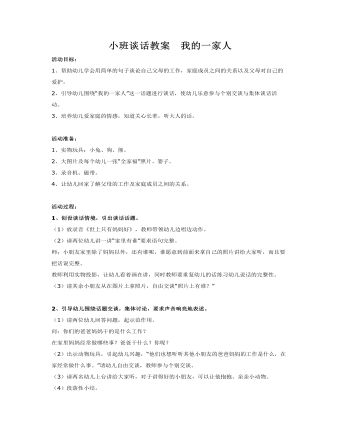
小班谈话教案 我的一家人
2、引导幼儿围绕“我的一家人”这一话题进行谈话,使幼儿乐意参与个别交谈与集体谈话活动。3、培养幼儿爱家庭的情感,知道关心长辈,听大人的话。活动准备:1、实物玩具:小兔、狗、熊。2、大图片及每个幼儿一张“全家福”照片、篓子。3、录音机、磁带。4、让幼儿回家了解父母的工作及家庭成员之间的关系。 活动过程:1、创设谈话情境,引出谈话话题。(1)放录音《世上只有妈妈好》,教师带领幼儿边唱边动作。(2)请两位幼儿讲一讲“家里有谁”要求语句完整。师;小朋友家里除了妈妈以外,还有谁呢,谁愿意到前面来拿自己的照片讲给大家听,而且要把话说完整。教师利用实物投影,让幼儿看着画在讲,同时教师要重复幼儿的话练习幼儿说话的完整性。
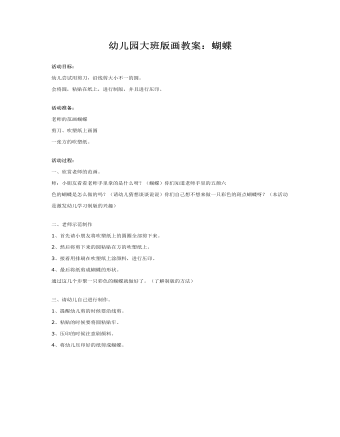
幼儿园大班版画教案:蝴蝶
活动准备: 老师的范画蝴蝶 剪刀、吹塑纸上画圆 一张方的吹塑纸。 活动过程: 一、欣赏老师的范画。 师:小朋友看看老师手里拿的是什么呀?(蝴蝶)你们知道老师手里的五颜六 色的蝴蝶是怎么做的吗?(请幼儿猜想谈谈说说)你们自己想不想来做一只彩色的斑点蝴蝶呀?(本活动是激发幼儿学习制版的兴趣)
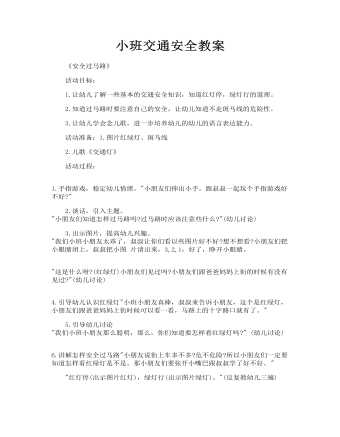
小班交通安全教案(精品版)
1.手指游戏,稳定幼儿情绪。"小朋友们伸出小手,跟叔叔一起玩个手指游戏好不好?" 2.谈话,引入主题。 "小朋友们知道怎样过马路吗?过马路时应该注意些什么?"(幼儿讨论) 3.出示图片,提高幼儿兴趣。 "我们小班小朋友太乖了,叔叔让你们看以些图片好不好?想不想看?小朋友们把小眼睛闭上,叔叔把小图 片请出来,3,2,1,好了,睁开小眼睛。 "这是什么呀?(红绿灯)小朋友们见过吗?小朋友们跟爸爸妈妈上街的时候有没有见过?"(幼儿讨论)

中班教案《搬新家》说课稿
在“我爱我家”主题开展过程中,我们为幼儿创设了一种家的氛围,让幼儿产生爱的体验。我想,音乐活动也可以配合这一主题,丰富幼儿的情感。因此,我就想以大头儿子和小头爸爸这两个幼儿耳熟能详的动画人物为主人公,创设一个活动情景作为本次活动的载体。一方面,活动中的律动动作大部分是双人动作,如亲一亲、抱一抱、压跷跷板等,既能在日常生活中幼儿与父母身上找到痕迹,又能体现亲子感情,所以用大头儿子和小头爸爸贯穿整个活动,可以自然地激发幼儿对家人、对亲情的认知和体验。
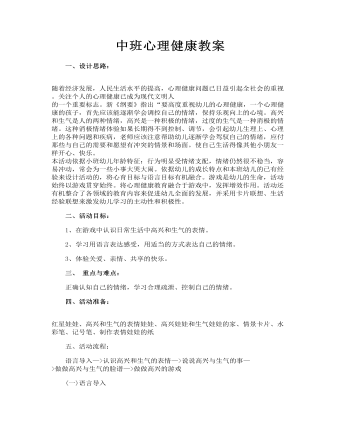
中班心理健康教案
二、活动目标: 1、在游戏中认识日常生活中高兴和生气的表情。 2、学习用语言表达感受,用适当的方式表达自己的情绪。 3、体验关爱、亲情、共享的快乐。 三、 重点与难点: 正确认知自己的情绪,学习合理疏泄、控制自己的情绪。 四、活动准备: 红星娃娃、高兴和生气的表情娃娃、高兴娃娃和生气娃娃的家、情景卡片、水彩笔、记号笔、制作表情娃娃的纸
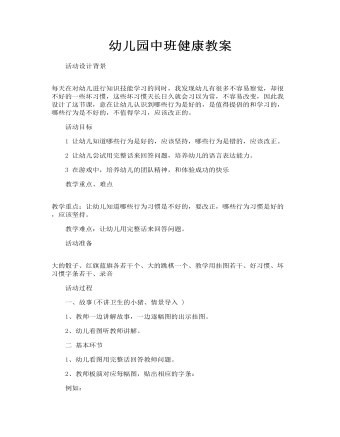
幼儿园中班健康教案
活动目标 1 让幼儿知道哪些行为是好的,应该坚持,哪些行为是错的,应该改正。 2 让幼儿尝试用完整话来回答问题,培养幼儿的语言表达能力。 3 在游戏中,培养幼儿的团队精神,和体验成功的快乐 教学重点、难点 教学重点:让幼儿知道哪些行为习惯是不好的,要改正,哪些行为习惯是好的,应该坚持。 教学难点:让幼儿用完整话来回答问题。
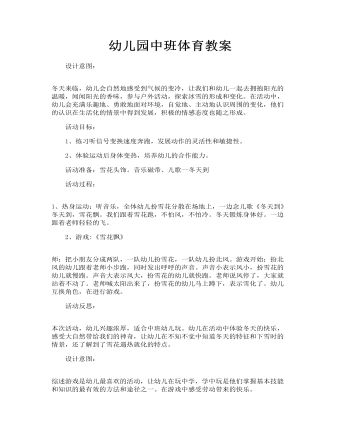
幼儿园中班体育教案
活动目标: 1、练习听信号变换速度奔跑,发展动作的灵活性和敏捷性。 2、体验运动后身体变热,培养幼儿的合作能力。 活动准备:雪花头饰。音乐磁带、儿歌--冬天到 活动过程: 1、热身运动:听音乐,全体幼儿扮雪花分散在场地上,一边念儿歌《冬天到》冬天到,雪花飘。我们跟着雪花跑,不怕风,不怕冷。冬天锻炼身体好。一边跟着老师轻轻的飞。
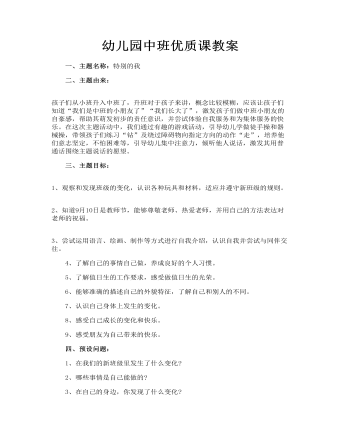
幼儿园中班优质课教案
三、主题目标: 1、观察和发现班级的变化,认识各种玩具和材料,适应并遵守新班级的规则。 2、知道9月10日是教师节,能够尊敬老师、热爱老师,并用自己的方法表达对老师的祝福。 3、尝试运用语言、绘画、制作等方式进行自我介绍,认识自我并尝试与同伴交往。 4、了解自己的事情自己做,养成良好的个人习惯。 5、了解值日生的工作要求,感受做值日生的光荣。 6、能够准确的描述自己的外貌特征,了解自己和别人的不同。
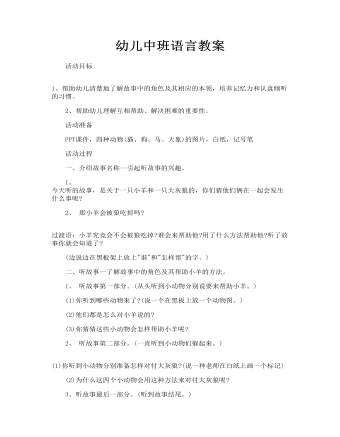
幼儿中班语言教案
一、介绍故事名称--引起听故事的兴趣。 1、 今天听的故事,是关于一只小羊和一只大灰狼的,你们猜他们俩在一起会发生什么事呢? 2、 那小羊会被狼吃掉吗? 过渡语:小羊究竟会不会被狼吃掉?谁会来帮助他?用了什么方法帮助他?听了故事你就会知道了? (边说边在黑板架上放上"谁"和"怎样帮"的字。)
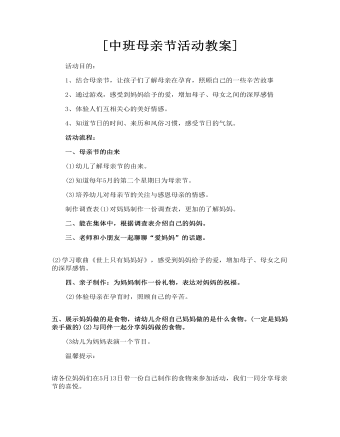
中班母亲节活动教案
一、母亲节的由来 (1)幼儿了解母亲节的由来。 (2)知道每年5月的第二个星期日为母亲节。 (3)培养幼儿对母亲节的关注与感恩母亲的情感。 制作调查表(1)对妈妈制作一份调查表,更加的了解妈妈。 二、能在集体中,根据调查表介绍自己的妈妈。 三、老师和小朋友一起聊聊“爱妈妈”的话题。
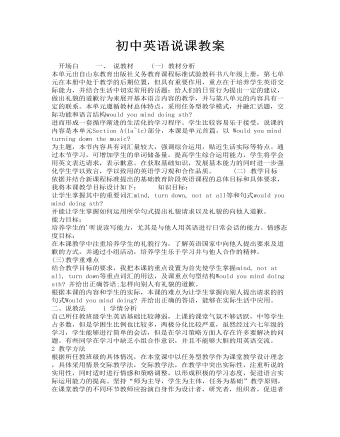
初中英语说课教案
(二) 教学目标 依据并结合新课程标准提出的基础教育阶段英语课程的总体目标和具体要求,我将本课教学目标设计如下: 知识目标: 让学生掌握其中的重要词汇mind, turn down, not at all等和句式would you mind doing sth? 并能让学生掌握如何运用所学句式提出礼貌请求以及礼貌的向他人道歉。
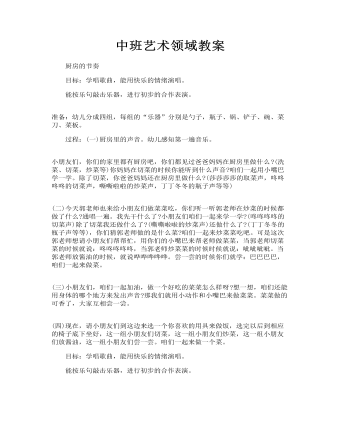
中班艺术领域教案
(二)今天郭老师也来给小朋友们做菜菜吃,你们听一听郭老师在炒菜的时候都做了什么?通唱一遍。我先干什么了?小朋友们咱们一起来学一学?(咚咚咚咚的切菜声)除了切菜我还做什么了?(嘶嘶啦啦的炒菜声)还做什么了?(丁丁冬冬的瓶子声等等),你们猜郭老师做的是什么菜?咱们一起来炒菜菜吃吧。可是这次郭老师想请小朋友们帮帮忙,用你们的小嘴巴来帮老师做菜菜,当郭老师切菜菜的时候就说:咚咚咚咚咚,当郭老师炒菜菜的时候时候就说:呲呲呲呲。当郭老师放酱油的时候,就说哗哗哗哗哗。尝一尝的时候你们就学:巴巴巴巴,咱们一起来做菜。
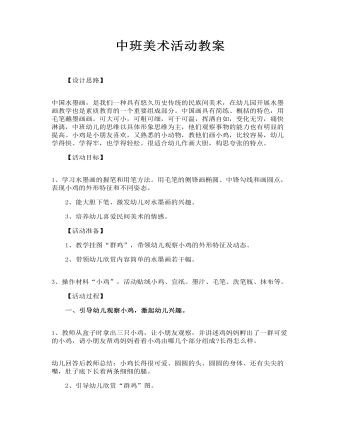
中班美术活动教案
一、引导幼儿观察小鸡,激起幼儿兴趣。 1、教师从盒子时拿出三只小鸡,让小朋友观察,并讲述鸡妈妈孵出了一群可爱的小鸡,请小朋友帮鸡妈妈看看小鸡由哪几个部分组成?长得怎么样。 幼儿回答后教师总结:小鸡长得很可爱、圆圆的头、圆圆的身体、还有尖尖的嘴,肚子底下长着两条细细的腿。 2、引导幼儿欣赏“群鸡”图。
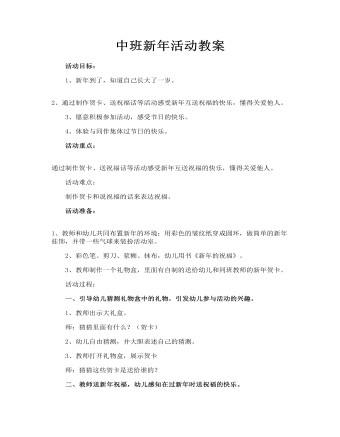
中班新年活动教案
1、教师和幼儿共同布置新年的环境:用彩色的皱纹纸穿成圆环,做简单的新年挂饰,并带一些气球来装扮活动室。 2、彩色笔、剪刀、浆糊、抹布,幼儿用书《新年的祝福》。 3、教师制作一个礼物盒,里面有自制的送给幼儿和同班教师的新年贺卡。 活动过程: 一、引导幼儿猜测礼物盒中的礼物,引发幼儿参与活动的兴趣。
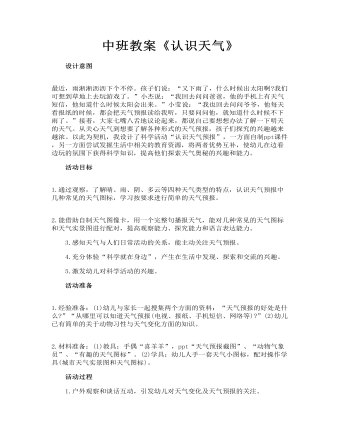
中班教案《认识天气》
1.通过观察,了解晴、雨、阴、多云等四种天气类型的特点,认识天气预报中几种常见的天气图标,学习按要求进行简单的天气预报。 2.能借助自制天气图像卡,用一个完整句播报天气,能对几种常见的天气图标和天气实景图进行配对,提高观察能力、探究能力和语言表达能力。 3.感知天气与人们日常活动的关系,能主动关注天气预报。 4.充分体验“科学就在身边”,产生在生活中发现、探索和交流的兴趣。 5.激发幼儿对科学活动的兴趣。
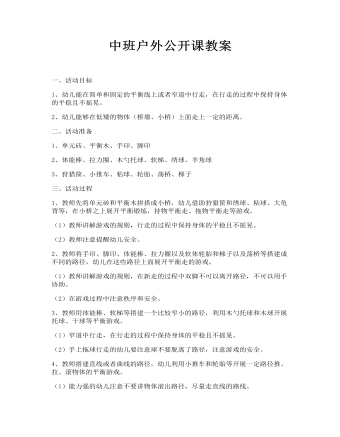
中班户外公开课教案
三、活动过程1、教师先将单元砖和平衡木拼搭成小桥,幼儿借助狩猎筐和绣球、粘球、大龟背等,在小桥之上展开平衡锻炼,持物平衡走、拖物平衡走等游戏。(1)教师讲解游戏的规则,行走的过程中保持身体的平稳且不摇晃。(2)教师注意提醒幼儿安全。2、教师将手印、脚印、体能棒、拉力圈以及软体轮胎和梯子以及荡桥等搭建成不同的路径,幼儿在这些路径上面展开平衡走的游戏。
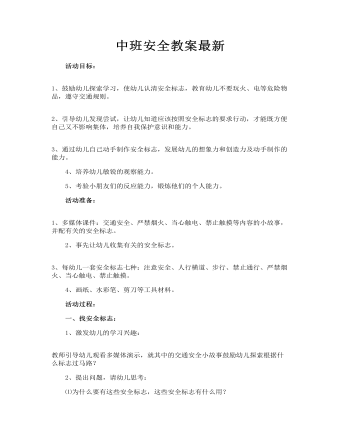
中班安全教案最新
1、多媒体课件:交通安全、严禁烟火、当心触电、禁止触摸等内容的小故事,并配有关的安全标志。 2、事先让幼儿收集有关的安全标志。 3、每幼儿一套安全标志七种:注意安全、人行横道、步行、禁止通行、严禁烟火、当心触电、禁止触摸。 4、画纸、水彩笔、剪刀等工具材料。

